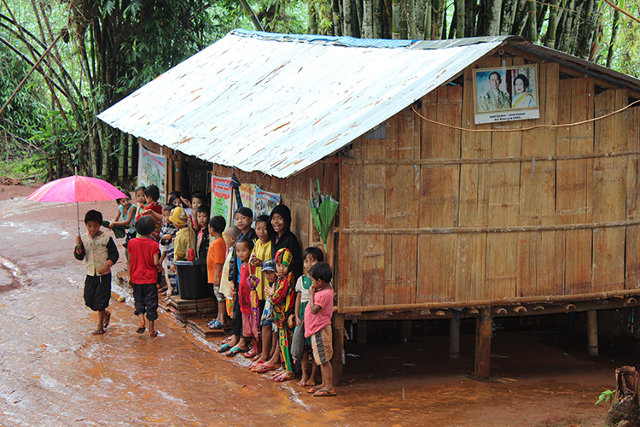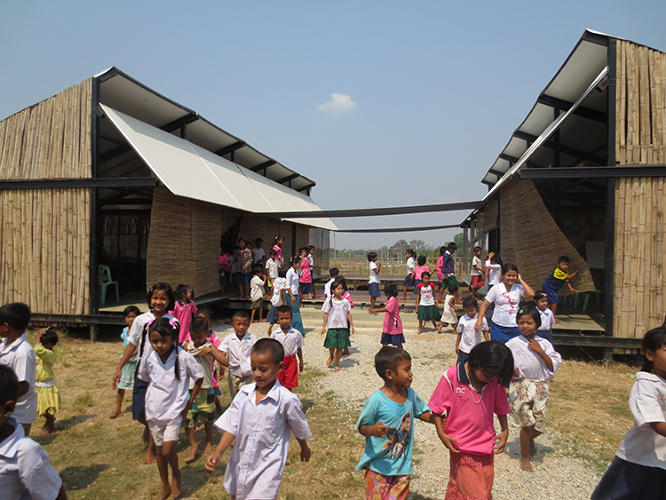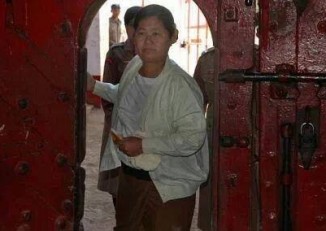NOBEL Peace Prize Laureate Aung San Suu Kyi says justice must be tempered by mercy when dealing with Australia's asylum seeker policy to separate children from their parents.
Ms Suu Kyi was asked by broadcast journalist Hamish Macdonald if she thought it was appropriate for the Abbott government to remove children from their families who seek asylum in Australia.
"Do you have rule of law in Australia?" she replied to thunderous cheers at a sold-out event at the Sydney Opera House.
"You must sort out these problems within the framework of rule of law but always remembering that justice must be tempered by mercy," Ms Suu Kyi said to another round of deafening applause.
The freedom fighter and Myanmar opposition leader was in Sydney to give a public address as well as collect two honorary degrees: one from the University of Sydney and one which was conferred by the University of
Technology, Sydney in 1997 but which she was unable to accept in person due to travel restrictions placed on her by the military junta.
She will collect a third honorary degree in a week when she accepts an honorary doctorate from Australian National University in Canberra tomorrow.
She said it was up to Australia who it chooses to accept as refugees but that the government of Myanmar had an obligation to protect everybody.
Ms Suu Kyi said there was "a tremendous lack of rule of law" all over Myanmar, which in turn left people feeling insecure.
She said her government had to make sure there was rule of law to give everyone security.
"We cannot have peace without security ... unless our people all feel secure you can't expect them to sit down and sort out their differences.
"People who are afraid of being killed or people who are afraid of having their property attacked are not going to sit down and talk sensibly to one another.
"I do not think that the government has been responsible enough in establishing rule of law," Ms Suu Kyi said.
She said that there was a distinct lack of transpareny and accountablity amongst government departments and "without that we can't have rule of law".
"Without rule of law we can't expect out people to settle their differences peacefully and sensibly," she said.
When asked why she wasn't vocal on certain matters, she said she had always "defended those whose human rights have been attacked" but people wanted condemnation, not defence.
"Particularly they say 'why am I not condemning this group' and it also applies to the military.
"I'm not condemning (them) because I have not found that condemnation brings good results.
"What I want to do is to achieve national reconciliation (and) as long as there's hate and fear there cannot be reconciliation," she said.
Those who believe Myanmar has fully reformed to a democratic nation are mistaken, Ms Suu Kyi says.
In a captivating address at the beginning of the event she highlighted the steps still to be taken to achieve democracy in her home country.
Ms Suu Kyi has evolved from a political prisoner under house arrest for almost two decades to Myanmar's presidential hopeful.
Myanmar has only recently allowed elections and has eased its brutal military regime but Ms Suu Kyi says the constitution is preventing the country from being truly democratic.
"Those of you who think that Burma has successfully taken the path to reform would be mistaken," she said.
"If you want to know why you are mistaken you only have to study the Burmese constitution.
"If you read it carefully you will understand why we can't have genuine democracy under such a constitution."
The leader of the National League for Democracy said a change to Myanmar's constitution required the vote of 75 per cent of the legislature.
Twenty-five per cent of the legislature is represented by the military members, which the non-elected army commander-in-chief appoints, she said.
"How can you call a constitution democratic when it can be amended or not amended in accordance with the will of one man who is an unelected post?" Ms Suu Kyi said.
While she confirmed her ambition to win presidential office at the next election, the constitution requires a president to have military experience.
Myanmar does not allow women in the defence academy.
Despite her lengthy period of detention Ms Suu Kyi believes she didn't have it as bad as those political prisoners - including three of the four people with her on the Australian tour - who were jailed.
But she never thought the sacrifices she made in the pursuit of democracy wouldn't be worth it.
"I always used to think if only one other person remained in Burma who wanted democracy, I would remain," she said.
The speech followed a hero's welcome in Sydney on Wednesday and a meeting with NSW Governor Marie Bashir.
Ms Suu Kyi will also visit Melbourne and Canberra on her five-day tour of Australia.
- See more at: http://www.theaustralian.com.au/news/world/aung-san-suu-kyi-calls-on-australia-to-be-merciful-to-refugees/story-e6frg6so-1226770015331#sthash.lbFSnDgH.dpuf













